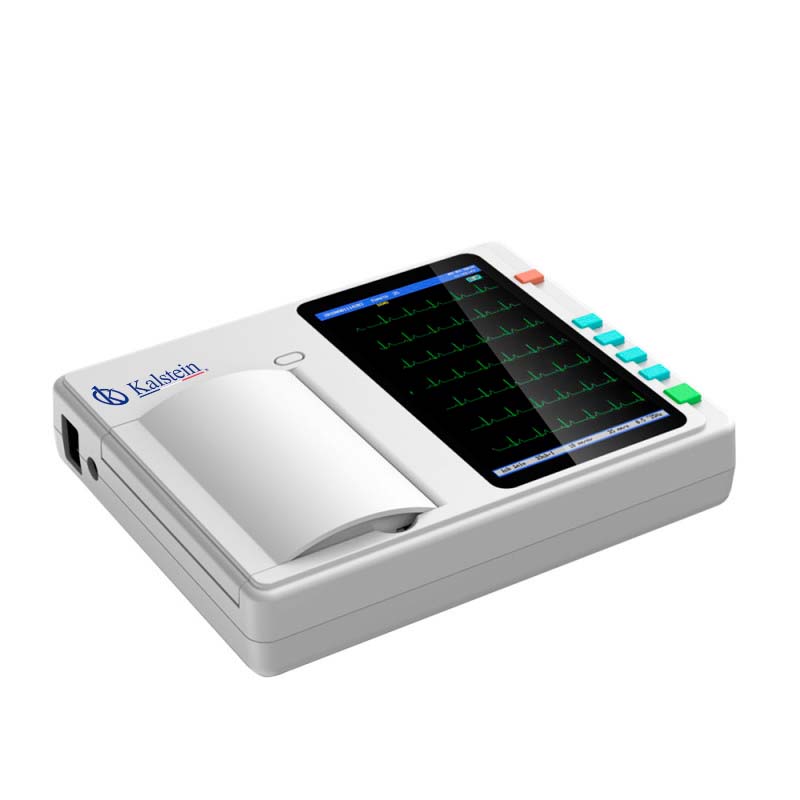The field of medicine has evolved significantly with the advancement of technology. One of the most crucial devices in diagnosing heart diseases is the electrocardiograph (ECG). Specifically, the Digital ECG Electrocardiograph for the medical line has revolutionized the way cardiac activity is monitored and analyzed.
This article offers an in-depth review of this device, exploring its aspects from design to performance, and highlighting its impact on improving clinical outcomes and diagnostic accuracy.
Design and Ergonomics of the Digital ECG Electrocardiograph
The design of an electrocardiograph is fundamental not only for its functionality but also for user comfort. The Digital ECG Electrocardiograph stands out for its ergonomic design, which facilitates its use in both hospital settings and outpatient clinics. The intuitive user interface allows healthcare professionals to operate the device easily, reducing the margin of error and improving diagnostic efficiency.
Portability is another crucial aspect of the Digital ECG design. With its compact and lightweight structure, this device can be easily transported between different areas of the hospital or even used for home visits. Additionally, its robust construction ensures durability and resilience, allowing for intensive use without compromising performance.
Technological Innovations in the Digital ECG Electrocardiograph
The Digital ECG Electrocardiograph incorporates multiple technological innovations that set it apart from traditional models. One of the most notable features is its ability to perform real-time analysis of cardiac data. This allows doctors to detect abnormalities immediately, which is crucial for quick decision-making in emergency situations.
Another significant innovation is the wireless connectivity of the Digital ECG. Thanks to this functionality, patient data can be instantly transmitted to electronic medical record systems, facilitating access and review by multiple specialists. This integration enhances collaboration among healthcare professionals and contributes to more coordinated and effective medical care.
Diagnostic Accuracy and Improved Clinical Outcomes
Diagnostic accuracy is a critical aspect of cardiology, and the Digital ECG Electrocardiograph excels in this area. Equipped with advanced interpretation algorithms, this device offers highly accurate readings that help doctors identify a wide range of cardiac conditions, from arrhythmias to myocardial infarctions.
Improved clinical outcomes are another key advantage of the Digital ECG. By providing detailed and precise data, it allows for early diagnosis and more effective treatment. This not only improves the patient’s prognosis but also reduces the need for additional tests, optimizing healthcare system resources and decreasing associated costs.
Ease of Use and Staff Training
One of the biggest challenges in implementing new medical technology is staff training. The Digital ECG Electrocardiograph has been designed with a user-friendly interface that minimizes the learning curve. Intuitive menus and clear instructions enable new users to quickly become familiar with the device, reducing the necessary training time.
Additionally, many manufacturers offer training programs and technical support to ensure that medical staff are fully prepared to use the device. This proactive approach not only improves staff competence but also ensures that patients receive high-quality care from the first use of the electrocardiograph.
Impact on Medical Research and Development
The Digital ECG Electrocardiograph is not only a valuable tool in daily clinical practice but also plays a crucial role in medical research. The precise and detailed data it provides are fundamental for clinical studies and trials of new treatments. By facilitating the collection and analysis of large volumes of data, this device contributes to advancing medical knowledge and developing new therapies.
Moreover, the ability of the Digital ECG to integrate with other monitoring and diagnostic technologies expands its applications in research. Researchers can combine electrocardiograph data with information from other devices to obtain a more comprehensive view of the patient’s health status, potentially leading to important discoveries in the field of cardiology.
Conclusion: The Future of Cardiac Diagnostics
In conclusion, the Digital ECG Electrocardiograph represents a significant advancement in medical technology, offering multiple benefits that enhance both diagnostic accuracy and clinical outcomes. Its ergonomic design, technological innovations, and ease of use make it an indispensable tool for healthcare professionals.
By integrating this device into daily medical practice, hospitals and clinics can improve the quality of care they provide to their patients. Additionally, its impact on medical research promises continuous advances in the diagnosis and treatment of heart diseases. With its ability to provide precise, real-time data, the Digital ECG is destined to be an essential component in the future of cardiac diagnostics.
If you’re seeking a blend of innovation and quality, you’ve come to the right place. At https://kalstein.africa/category-product/medical-line/ecg-digital-electrocardiograph/ we offer you the luxury to explore our exclusive catalog of laboratory equipment. We manufacture each piece of equipment with a level of excellence. Our intuitive and agile online shopping channels are designed for your convenience, ensuring the friendliest prices. Don’t hesitate any longer, we bring science to life, it’s time to become part of our community. https://kalstein.africa/

